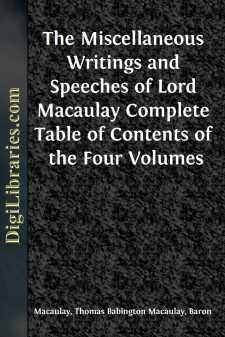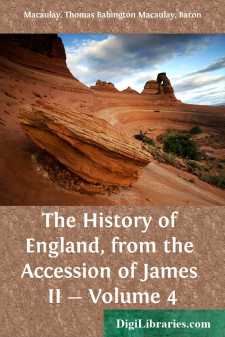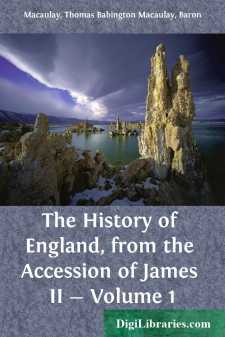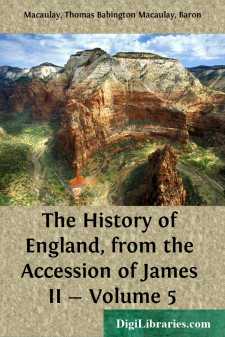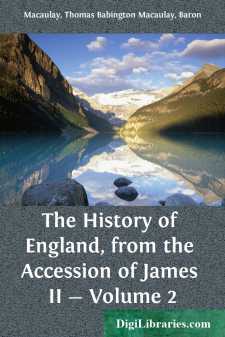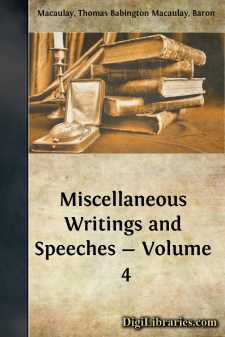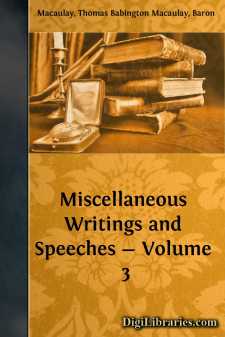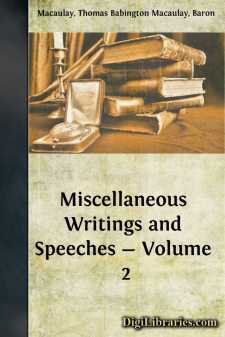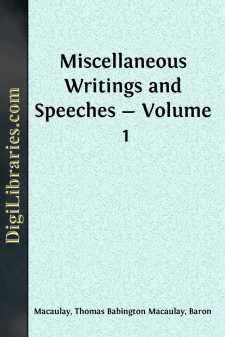Categories
- Antiques & Collectibles 13
- Architecture 36
- Art 48
- Bibles 22
- Biography & Autobiography 813
- Body, Mind & Spirit 142
- Business & Economics 28
- Children's Books 16
- Children's Fiction 13
- Computers 4
- Cooking 94
- Crafts & Hobbies 4
- Drama 346
- Education 46
- Family & Relationships 57
- Fiction 11829
- Games 19
- Gardening 17
- Health & Fitness 34
- History 1377
- House & Home 1
- Humor 147
- Juvenile Fiction 1873
- Juvenile Nonfiction 202
- Language Arts & Disciplines 88
- Law 16
- Literary Collections 686
- Literary Criticism 179
- Mathematics 13
- Medical 41
- Music 40
- Nature 179
- Non-Classifiable 1768
- Performing Arts 7
- Periodicals 1453
- Philosophy 64
- Photography 2
- Poetry 896
- Political Science 203
- Psychology 42
- Reference 154
- Religion 513
- Science 126
- Self-Help 84
- Social Science 81
- Sports & Recreation 34
- Study Aids 3
- Technology & Engineering 59
- Transportation 23
- Travel 463
- True Crime 29
Thomas Babington Macaulay Macaulay
Thomas Babington Macaulay was a British historian, politician, and writer known for his influential works on British history and literature. His most notable contributions include the multi-volume "History of England from the Accession of James the Second," which became a model of narrative history. Macaulay also played a significant role in introducing English education in India through his "Minute on Education," advocating for the promotion of Western literature and science.
Author's Books:
Sort by:
PREFACE. Lord Macaulay always looked forward to a publication of his miscellaneous works, either by himself or by those who should represent him after his death. And latterly he expressly reserved, whenever the arrangements as to copyright made it necessary, the right of such publication. The collection which is now published comprehends some of the earliest and some of the latest works which he...
more...
ON the eighteenth of January 1691, the King, having been detained some days by adverse winds, went on board at Gravesend. Four yachts had been fitted up for him and for his retinue. Among his attendants were Norfolk, Ormond, Devonshire, Dorset, Portland, Monmouth, Zulestein, and the Bishop of London. Two distinguished admirals, Cloudesley Shovel and George Rooke, commanded the men of war which formed...
more...
THE Revolution had been accomplished. The decrees of the Convention were everywhere received with submission. London, true during fifty eventful years to the cause of civil freedom and of the reformed religion, was foremost in professing loyalty to the new Sovereigns. Garter King at arms, after making proclamation under the windows of Whitehall, rode in state along the Strand to Temple Bar. He was...
more...
CHAPTER I. I PURPOSE to write the history of England from the accession of King James the Second down to a time which is within the memory of men still living. I shall recount the errors which, in a few months, alienated a loyal gentry and priesthood from the House of Stuart. I shall trace the course of that revolution which terminated the long struggle between our sovereigns and their parliaments, and...
more...
PREFACE TO THE FIFTH VOLUME. I HAVE thought it right to publish that portion of the continuation of the "History of England" which was fairly transcribed and revised by Lord Macaulay. It is given to the world precisely as it was left: no connecting link has been added; no reference verified; no authority sought for or examined. It would indeed have been possible, with the help I might have...
more...
Consecration of the Nuncio at Saint James's Palace; his public ReceptionThe Duke of SomersetDissolution of the Parliament; Military Offences illegally punishedProceedings of the High Commission; the UniversitiesProceedings against the University of CambridgeThe Earl of MulgraveState of OxfordMagdalene College, OxfordAnthony Farmer recommended by the King for PresidentElection of the PresidentThe...
more...
PREFACE. It was most reluctantly that I determined to suspend, during the last autumn, a work which is the business and the pleasure of my life, in order to prepare these Speeches for publication; and it is most reluctantly that I now give them to the world. Even if I estimated their oratorical merit much more highly than I do, I should not willingly have revived, in the quiet times in which we are so...
more...
FRANCIS ATTERBURY. (December 1853.) Francis Atterbury, a man who holds a conspicuous place in the political, ecclesiastical, and literary history of England, was born in the year 1662, at Middleton in Buckinghamshire, a parish of which his father was rector. Francis was educated at Westminster School, and carried thence to Christchurch a stock of learning which, though really scanty, he through life...
more...
"The Poetical Works of John Dryden". In 2 volumes.University Edition. London, 1826. The public voice has assigned to Dryden the first place in the second rank of our poets,—no mean station in a table of intellectual precedency so rich in illustrious names. It is allowed that, even of the few who were his superiors in genius, none has exercised a more extensive or permanent influence on the...
more...
PREFACE. Lord Macaulay always looked forward to a publication of his miscellaneous works, either by himself or by those who should represent him after his death. And latterly he expressly reserved, whenever the arrangements as to copyright made it necessary, the right of such publication. The collection which is now published comprehends some of the earliest and some of the latest works which he...
more...


